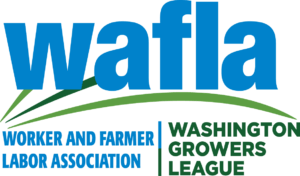During harvest, judge restores prevailing wages for Washington farmworkers
During harvest, judge restores prevailing wages for Washington farmworkers
By Don Jenkins, Capital Press
July 3, 2024
A federal judge in Seattle issued a preliminary injunction July 2, ordering the U.S. Department of Labor to immediately reinstate prevailing piece-rate pay for picking apples, cherries and berries in Washington.
The order directly impacts farms that employ foreign workers with H-2A visas, but effects could spread to other farms competing for labor. The order could raise wages for some farmworkers for the rest of the harvest.
U.S. District Judge John Chun resurrected prevailing piece-rates the Labor Department set in 2022, but that lapsed more than a year ago and have not been replaced.
The farmworker union Familias Unidas por la Justicia argues the lack of prevailing piece-rates opens the way for more farm jobs to pay less-lucrative hourly wages.
Chun agreed. "The potential harm to the farmworkers is significant," the order reads.
Farm groups were trying to understand the ruling's impacts Wednesday. "There's a lot of anxiety and concern," Washington State Tree Fruit Association President Jon DeVaney said.
"In the middle of cherry harvest, a judge has reinstated the 2022 prevailing wages," he said. "That's going to create a lot of confusion."
H-2A farmworkers in Washington must be paid at least $19.25 an hour, unless prevailing piece-rates result in higher earnings. The Labor Department argued the hourly wage protected pay for domestic workers.
Familias attorney Andrea Schmitt of Columbia Legal Services said the preliminary injunction was a step in keeping hourly wages from supplanting piece-rates.
"We're very pleased with it because it is so much better than it was before, but it's not a permanent solution because we know wages go up every year," she said.
Familias' suit targets the department's rules for setting prevailing wages. The challenged rules include one that calls for piece-rates to automatically expire after one year, even if new wages have not been set.
The Washington Employment Security Department surveyed wages in 2023, but the Labor Department has not updated prevailing wages for the 2024 harvest.
ESD submitted the information to the Labor Department on Aug. 11, a spokeswoman for the state agency said in an email Wednesday. Efforts to obtain comment from the Labor Department were unsuccessful.
Schmitt said the Labor Department hasn't explained why it hasn't published new prevailing piece rates.
"It certainly seems someone dropped the ball. It's hard to say from publicly available information who it is," she said.
Chun's order sets a piece-rate of $28.26 per bin for most varieties of apples. Piece-rates for cherries, blueberries and some other types of berries also were restored. The rates were based on 2020 wage surveys.
Some growers may forego harvesting lower-value varieties, DeVaney said.
Restoring the wages does not appear to be a significant hardship for farmers, who paid the piece-rates in previous years, according to Chun.
The Labor Department on Wednesday updated a website to reflect the restored prevailing wages. The rates will stay in place until the lawsuit between Familias and the Labor Department is resolved, according to the order.
The impact to H-2A employers will depend on their crops and contracts with workers, said Scott Dilley, spokesman for WAFLA, which helps farms obtain foreign workers.
"I think some growers are going to be fine, but some may have significant impacts," he said.
Through the end of March, the Department of Labor certified 18,434 farm jobs were available for H-2A workers in Washington, the fourth most among all states.
